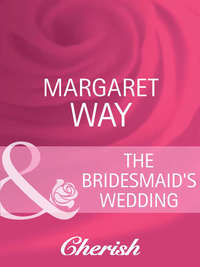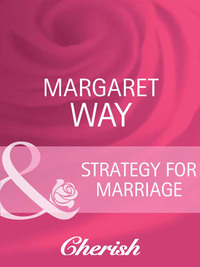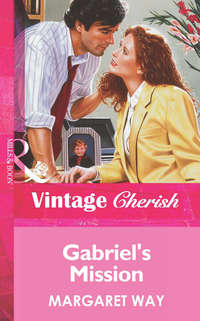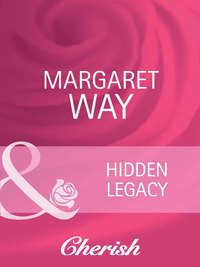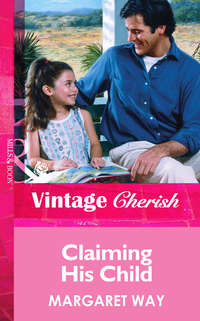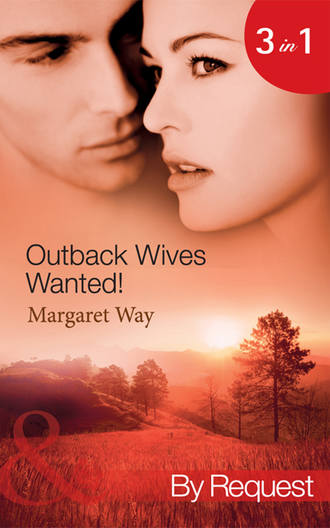
Полная версия
Outback Wives Wanted!: Wedding at Wangaree Valley / Bride at Briar's Ridge / Cattle Rancher, Secret Son

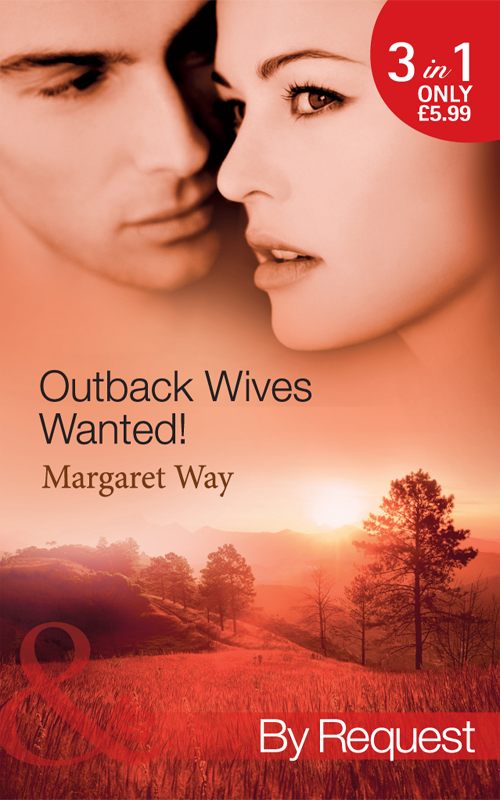
Outback Wives Wanted!
Wedding at Wangaree Valley
Bride at Briar’s Ridge
Cattle Rancher, Secret Son
MARGARET WAY

Three eligible bachelors…
Outback Wives Wanted!
Three dramatic and enticing love stories from one beloved Mills … Boon author!
About the Author
MARGARET WAY a definite Leo, was born and raised in the subtropical River City of Brisbane, capital of the Sunshine State of Queensland. A conservatorium-trained pianist, teacher, accompanist and vocal coach, she found her music career came to an unexpected end when she took up writing, initially as a fun thing to do. She currently lives in a harbourside apartment at beautiful Raby Bay, a thirty-minute drive from the state capital, where she loves dining al fresco on her plant-filled balcony, overlooking a translucent green marina filled with all manner of pleasure craft from motor cruisers costing millions of dollars and big, graceful yachts with carved masts standing tall against the cloudless blue sky to little bay runabouts. No one and nothing is in a mad rush, so she finds the laid-back village atmosphere very conducive to her writing. With well over a hundred books to her credit, she still believes her best is yet to come.
WEDDING AT WANGAREE VALLEY
CHAPTER ONE
ALANA awoke before the birds. She had long since made it her habit. This was the time when the Valley was possessed of a special magic. Misty shades and depths cloaked the land, sliding down the ravines between the sentinel hills, only to vanish with the first slants of the rising sun. Occasionally a lone kookaburra beat her to it, but she managed her pre-dawn awakening pretty much every day of her life, even on Sunday, and Sunday was her well-deserved day of rest. She didn’t need the hysterical wake-up call of the kookaburras or the ecstatic screech of flocks of cockatoos to rouse her. Her body clock was set. Besides, there was such beauty in the stillness, a wonderful quietude of the heart, that reached out and folded her in its soft arms.
Barefooted, she padded out onto the verandah, her spirits lifting as she was swept by cool little breezes. They whipped at her thin nightdress, moulding it against her body like petals sheathed a rose. She arched her back and stretched her arms, something sensual in her actions. The palest green mist hung over the densely treed hills, and the sky above was a transparent grey that was washed with pastel bands of yellow and amethyst along the horizon.
One twinkling star still blossomed, diamond-white with the faintest pink halo.
She had a wonderful unobstructed view over the Valley from the upper verandah. At all times of the day it presented a picture postcard of this part of rural Australia that was well beyond the precincts of the great Desert Heart. The garden beneath her was overflowing with colour: hibiscus, oleander, frangipani, giant bouginvillaea bushes in hot pink, purple and white. They spilled over arbours and walls and even climbed trees in their bid to reach the sun; close by, a rich diversity of nectar bearing native shrubs brought in parrots and brilliantly plumaged little lorikeets in their legions. It made a wild paradise of a garden that was now sadly neglected and in many places running rampant. The garden was huge by any standards. There simply wasn’t the time.
Briar’s Ridge was the centre of her life, but nowadays the homestead was hurting badly. Still, the Valley was the most desirable place on earth to live. This was where she was rooted. This was the place she had run wild as a child. She loved the fragrance of the eucalypts that dominated the high ridges, filling her lungs with their astonishing freshness. She felt she could even gargle on it, it had such antiseptic power. The eucalypts could be counted upon to flood the landscape with their marvellous aromatic scents and, when in flower, an amazing range of pods and blossom. Reluctantly she lifted her hands off the balustrade. It was so beautiful, a still dreaming world, but already the sky was lightening. Better get going.
Another day, another battle for survival. Over the past three years the farm had been going downhill, despite all their back-breaking hard work. Of course there was the drought. The man on the land was always fighting drought, but her father’s decline into a grief-stricken, booze-fuelled lethargy was the crux of the matter. Inside she was torn by her suspicions over Guy Radcliffe—the man she privately dubbed Lord and Master of the Valley—who had been giving her father a helping hand. It was all done on the quiet, of course. That was Guy’s way. Nevertheless, the thought oppressed her. Her feelings towards Guy—though she had known him all her life—were so strangely ambivalent they filled her with confusion; a confusion she was always at great pains to hide.
Guy Radcliffe, as Master of Wangaree, one of the nation’s great historic sheep stations, was without a doubt the richest and most successful man in a highly prosperous region, and he was a well-known philanthropist. It was equally well known that he liked to keep his many dealings with his adoring subjects strictly under wraps. Dispensing largesse and a helping hand was a Radcliffe tradition, as befitting the Valley’s leading family since the earliest days of settlement. Guy’s ancestors had pioneered Wangaree Valley. For more than a century their wealth had ridden on the sheep’s back. Then, with the downturn in the wool industry, the Radcliffes had been among the first of the sheep barons to diversify. These days Radcliffe Wine Estates had been added to the family portfolio. In a few short years it was already at the forefront of viticulture, with Guy as company chairman and brilliant CEO.
There wasn’t much Guy couldn’t do. He was The Man. No argument. Not only did he oversee the Radcliffe wine and olive production, he also still adhered to the old tradition of producing the world’s best ultra-fine wool, prized by the textile industry and the world’s great fashion houses. This most beautiful and expensive cloth was well suited to blending with silk and cashmere. Briar’s Ridge, on the other hand, had until fairly recently produced excellent fine-medium wool, suitable for middle-weight suiting. If the coming wool sales went badly, the farm could slide into ruin.
Could they possibly hold on?
A few splashes of bracingly cold water brought her fully awake. She stared in the mirror unseeingly as she patted her face dry with a soft towel. She always laid her gear out the night before to save time: same old thing. Hers was a uniform of tight fitting jeans—she looked great in them, or so her good friend Simon told her—and today a blue and white checked cotton shirt. Seated on the side of the bed, she bent to retrieve her boots, pulling them on over grey socks. She didn’t even bother to check her appearance. Who was to see her but the sheep and her dogs? The dogs were beautiful border collies, Monty and Brig—Brig being short for Brigadier. Border collies were special dogs, in her opinion. Though some sheep men in the Valley wouldn’t have them. They thought them too temperamental, preferring sprightly kelpies or Australian Shepherds. Certainly Border Collies could seriously misbehave if they weren’t getting enough exercise. They had quite a tendency to nip heels, which didn’t make them popular with visitors, and they could be destructive, but their phenomenal intelligence, their wonderful herding ability and their infinite energy, willingness and capacity to work tirelessly all day long had won Alana’s heart.
From long habit she quickly applied sunblock to her face, throat and the V above her shirt, and put protective gloss over her lips. A square of scarlet silk secured her thick honey blonde hair at the nape. She shoved her well worn cream Akubra down over her forehead as she made for the door. Barely ten minutes had elapsed, but the light had changed. The soft dove-grey of pre-dawn was taking on a solid blue cast as the sun leaned over the hills, flooding the Valley in golden dayshine.
Now the dawn chorus was up, building to a great crescendo. The noise was deafening to a city-dweller. She loved it. Nothing sweeter. Thousands and thousands of male birds in the Valley calling love songs to the thousands and thousands of females ready to listen. It usually took a good hour for the cacophony to die down, but some birds persisted for the best part of the day, pouring out their passion.
Today it was her job to ride up into the hills and round up the wethers—the castrated male sheep—before they started to scatter all over the hillside or moved deeper into the ridges with their tall trees. Usually she had her older brother Kieran’s invaluable help, but Kieran was away in Sydney on business for their dad. Briar’s Ridge was so deep in hock there was the real, sickening possibility they could lose it. These days their father rarely left home. He clung to the valley where his wife, their mother, was buried. Alana swallowed on the agonisingly hard lump in her throat. She couldn’t afford to break down. She was no stranger to sorrow, but life went on—no matter what.
Downstairs the homestead was silent, except for the loud ticking of the English long-case clock in the entrance hall. It kept wonderful time and was actually very valuable. Her mother had brought it and all the other beautiful antiques in the house with her on her marriage. Some people in the Valley—her Denby relatives in particular—thought Annabel Callaghan-née-Denby had married beneath her. Like the Radcliffes, the Denbys were the old squattocracy.
One hand on the mahogany banister, Alana descended the central staircase, turning left to tiptoe along the wide, polished wood corridor, covered with its splendid Persian runner—her mother’s. She moved past the big master bedroom—her father no longer slept there—and on to a much smaller room that in the old days had been the nursery. There their father—a big man, easily topping six feet—had set himself up, turning his back on all his old comforts and the crushing memory of having a much loved woman lying beside him, aching to hold her when she was no longer there.
The door was ajar, so she could hear him snoring. Even that was a relief. These days, almost three years after her mother’s death, Alana dreaded the thought that one morning she would find her beloved father dead. Broken hearts killed. Guilt killed. Even his drunken snoring sounded desperate. She pushed the door a little more, saw him lying, his dark, tanned, handsome face squashed into a pillow, his raven, silver-flecked curls matted. He was covered by a very beautiful ultra-fine wool rug her mother had woven. One long brown arm was flung over the side of the bed, and an empty bottle of whisky lay on its side, a few inches from his fingertips.
Just how many empty bottles had she dumped, even hidden? He always bought more. On the small bedside table was a large studio portrait in an antique silver frame. A young woman’s lovely smiling face looked out of it. The hairstyle was different, but the thick honey-blonde hair, the creamy complexion, the large hazel eyes that at different times had turned pure green, were the same. Then there was the smile. It could have been a photograph of her. Alana vividly remembered how the close resemblance between them had delighted her mother.
“When you’re older, my darling girl, you too will be named the most beautiful woman in the valley at the Naming.”
The Naming was a special event at Wangaree’s Wine Festival. The festival attracted large crowds from all over the State of New South Wales and beyond. Wine-lovers, food-lovers, music-lovers—they all came. And Guy always hired some famous artist to perform under the stars in the grounds of his lovely historic mansion, Wangaree. The Naming didn’t happen every year, more like every three, but Guy had already announced, to great excitement, that it would be on the agenda this year. It wasn’t just the honour—there was an all-inclusive holiday for two to California’s beautiful Napa Valley with it, and spending money to boot!
She had no intention of entering. She thought of herself as a modest working girl. Besides, there was no money for a knock-out evening gown—though she could still get into the beautiful dress her mother had made her for her eighteenth birthday party. Let one of her Denby cousins carry off the prize. There were three of them: Violette, Lilli and Rose. All flower names, all born into a privileged world far removed from her own. Indeed, there had been little or no interaction between the families. Violette—never, never Vi—the eldest, at twenty-seven, and judged to be the most glamorous of the three girls, but not by much. All three sisters were extremely good-looking, although Rose was by far the nicest. Violette and Lilli were pure snobs, and Violette was one of Guy’s special friends—but so far there had been no serious commitment, like an engagement.
Thank God! Something inside of Alana shied away violently from the thought of Violette’s ever becoming Mrs Guy Radcliffe. But then she didn’t want any other girl in the Valley to become his wife either. Now, that was a real puzzle. It wasn’t as though she was in the running, or as if she wasted any time making herself unhappy about it. Her world was very different from Guy’s. Violette was certain to win The Naming. Good luck to her.
As it happened, Alana’s mother had been the inspiration for the original Naming, though the festival was the brainchild of the Radcliffes. She thought she would never be as beautiful as her mother, Annabel, and nor did she have her mother’s wonderful craft skills. Her mother had excelled at quilting, rug-making, dressmaking, cooking, baking, making a house and garden beautiful, keeping her family well and happy. All those were art forms. Her mother had had them in abundance. Her own skills were with animals. Alana was an excellent rider. She had won many cross country and endurance races, beating Violette, who was a fine rider, on three separate occasions. That hadn’t gone down too well with the Denbys. They had the born-to-win mentality of the Valley’s social elite.
With the familiar tug of sadness she closed the door on her sleeping father, leaving him to his self induced oblivion. Every day of her life, while she was up in the hills within the cathedral of trees, she prayed he would break out of his prison of guilt and remorse. Everyone in the valley except Alan Callaghan knew it wasn’t his fault his wife had died after a crash involving their station ute and a big four-wheel drive leisurely exploring the famous sheep and wine district. Holding to the centre of an unfamiliar valley road, the four-wheel drive had side-swiped the ute hard as it rounded a bend. Alan Callaghan and the driver of the four-wheel drive had literally walked away, with minor injuries—her father a broken wrist. Annabel Callaghan had not been so lucky. For some reason she hadn’t been wearing her seat belt, though she had always been so particular with her children.
“Fasten up, Kieran. Fasten up, Lana. I don’t care if we are on a back road. Do as I tell you now.”
Her mother had not fastened up that day. That was the tragic part. A life lost through one careless mistake.
“I should have seen to it. Why didn’t I?”
Alan Callaghan would never forgive himself.
In the big, bright yellow and white kitchen, Alana grabbed up a couple of muesli bars and an apple, then let herself out though the back door, heading for the stables. The stables were a distance from the homestead, on the far side of the home paddock. Her fastidious mother had not wanted a single horsefly to get into the house, so her father had had the stables relocated even before her mother had moved in as a new bride.
Buddy was already up and about, ready to greet her with his brilliantly white smile. Buddy, now around eighteen—no one including Buddy knew his exact age—was aboriginal, an orphan who had landed on their doorstep almost ten years ago to the day. Their mother had put the raggedy boy into a warm soapy tub, rustled up some of Alana’s unisex clothes, dressed Buddy in them, then fed the starving child. Enquiries had been made, but no one had turned up to claim Buddy. The family had unofficially adopted him.
It was Buddy’s job, among other tasks, to look after the horses and keep the stables clean and orderly. He did all his jobs well and conscientiously, immensely proud of the fact that the kindly Callaghans had not only taken him in and sent him off to school—which he had loathed from day one—but eventually given him a job and, above all, somewhere nice to live.
“Morning, Miss Lana.”
“Morning, Buddy.” Alana returned the greeting with affection. “Hard at it, as usual?”
“I like to keep things just so. You know that. How’s Mr Alan this mornin'?” Buddy loved her father. He had worshipped her mother. Since she’d been gone Buddy had made time to religiously look after her rose garden.
“Not so good, Buddy.” Alana shook her head, fighting off a wave of despondency.
“That’s real sad. Devil-man’s at ‘im!”
“Sure is,” Alana agreed. “I’ll take Cristo this morning.”
“Already got ‘im saddled up.” Buddy gave a complacent grin. He ducked back into the cool dim interior, then returned leading a rangy bright chestnut gelding—good bloodstock, like the other five in the stable.
“You’re psychic, Buddy,” Alana pronounced, believing it to be so.
“Never been sick in me life, Miss Lana,” Buddy protested, his expression uncertain.
“Not sick—psychic,” Alana answered, swinging herself up into the saddle. “Psychic means you’ve got spiritual powers.”
“That’s me!” Buddy visibly brightened. “Must have a teeny bit of Wangaree blood in me.”
“Ah, the long-vanished Wangaree!” Alana gave a regretful sigh, looking up towards the surrounding hills.
The trees were standing tall, their silhouette greenish black against a radiant unclouded blue sky. The Valley had been the Wangaree’s tribal ground. Wangaree Homestead had been named in honour of that lost tribe.
Alana toiled for hours, driving the wethers down from the ridge at a steady pace into the low country. The mustering of sheep and the directing of them to various locations around the property required plenty of patience and skill. Monty and Brig were in their element, with wonderfully eager expressions, floating around the mob and keeping them in a tidy, closely packed flowing stream. She provided the orders and her dogs carried them out, revelling in the chance to show her what they could do. A few sheep with a little more rebellion than the rest of the docile mob tried to make a break for the scrub, almost losing themselves in the golden grasses, but Monty—a low, near-invisible streak, his neck chain jingling—made quick work of herding them back into line, with a quick nip to a hapless hoof. The creek that wound through the property was glittering, as if a crowd of people were squatting beside it flashing mirrors. Alana always wore sunglasses. They were a must to protect her eyes from the searing glare.
These wethers were due to be drenched, but she would have to wait for Kieran to help her. Kieran was due home the day after next. She missed him when he went away. Life was pretty grim and enormously worrying, with their father the way he was. It broke her heart that the less compassionate people in the district had labelled her father “the Valley drunk.” Grief affected people in different ways. Her father, once a light drinker, enjoying a few cold beers at most, had embraced the whisky bottle with a vengeance.
She lifted her head to the wide-open sky. It was an incredible lapis-blue, virtually cloudless. A hot air balloon was almost directly overhead, sailing through the air as free as a bird. The Valley was a centre for sky-diving and parachuting too. She put up her hand and waved. The tourists waved back. They loved seeing the Valley this way. Wangaree and the adjoining valleys were at the very heart of one of the world’s great wine growing regions, and only a few hours’ drive from the country’s biggest and most vibrant city: Sydney.
Mid-morning, driven by hunger, she made her way back to the homestead. Two muesli bars and an apple didn’t fill a hard-working girl’s tummy. She stopped for a moment to admire her mother’s rose garden and say a little prayer. It was a daily ritual. She didn’t know if she believed in God any more, but she did it anyway. Her mother had been a believer. She missed her mother terribly.
Alana snapped out of it with an effort. How clever Buddy was! He had taken in everything her mother had taught him. High summer, and the roses were in extravagant bloom. The colours ranged from purest white through yellows and pinks to a deep crimson. Some of her mother’s favourites, the old fashioned garden roses, were wonderfully scented. Drought or no, her mother’s rose garden was putting on a superb display. For that matter the drought hadn’t had a detrimental effect on the grapes. The yield was down, certainly, but the quality was up. They had experienced just enough winter rain, with no damaging summer storms that could wipe out a vineyard in less than ten minutes.
She could hear Guy’s well-bred, sexy voice predicting, “This will be a vintage year.” She could hear his voice so clearly he might have been standing right beside her. But then Guy was so vitally alive he seemed physically present even when he wasn’t. At least that was what she believed. She even had to hold back a little moan, as though something sharp pricked at her heart. In his own way Guy Radcliffe was a god, complete with a valley full of worshippers. Certainly he was as splendid as any man might wish to be. Everyone adored him.
It fell to her to be the odd woman out.
Rounding the side of the house, she saw Simon’s Range Rover making its way out of the tunnel of trees that lent beauty and shade to the long drive up to the homestead. Her heart lifted. He could stay and have something to eat with her. She and Simon were the best of friends. The bond had sprung up in pre-school. Simon had been a real dreamer then, and very, very shy. He still was, come to that, and rather a bit too much on the intense side. She had taken charge of him right from the beginning, almost like a little mother. Her role had been to keep Simon safe.
“You must have been put on earth just for me, Lainie!”
That had been when the two of them had been standing hand in hand before the manger at a midnight service one Christmas Eve. She had given him a big squishy hug. What a pair they must have been!
Simon had lost every playground fight when she wasn’t around. The kids—and there had been some fair terrors around the Valley—had known not to mess with her. She’d been tough, and her big brother Kieran tougher. Simon was a Radcliffe—Guy’s first cousin—and that should have made him bullet proof. But it hadn’t—rather the reverse. Simon just seemed to be a natural-born victim. A big factor in his timidity could well have been the untimely loss of his playboy father before he was into his teens. Philip Radcliffe had died at the wheel of his high-powered car. His companion on that fateful day had not been his wife, but a Sydney socialite.
Simon’s widowed mother had not gone mad with grief. She had become as bitter as ever a scorned woman could, clinging tight to Simon, her only child, and smothering him in an unhealthy possessive love. Simon, who was very bright, like all the Radcliffes, had eventually gone off to university, where he’d thought himself safe from his mother’s excessive love—only to have to come home to Augusta Farm to a mother “terrified of being alone.” Though anyone who saw Rebecca Radcliffe throw up her narrow dark head, flash her black eyes and flare her thin nostrils would have been forgiven for thinking she wasn’t terrified of anyone or anything. It was the other way around.


